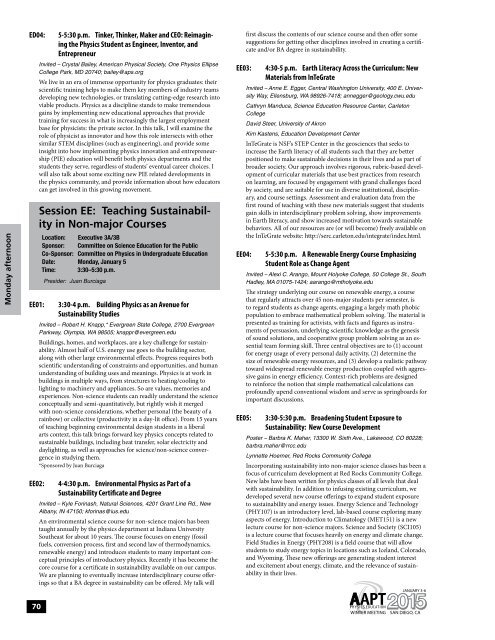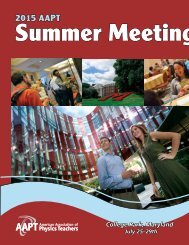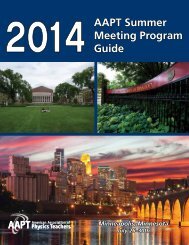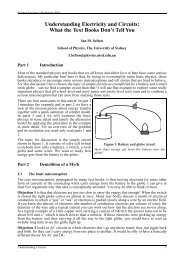final-program-12-23-14-3
final-program-12-23-14-3
final-program-12-23-14-3
You also want an ePaper? Increase the reach of your titles
YUMPU automatically turns print PDFs into web optimized ePapers that Google loves.
Monday afternoon<br />
ED04:<br />
70<br />
5-5:30 p.m. Tinker, Thinker, Maker and CEO: Reimagining<br />
the Physics Student as Engineer, Inventor, and<br />
Entrepreneur<br />
Invited – Crystal Bailey, American Physical Society, One Physics Ellipse<br />
College Park, MD 20740; bailey@aps.org<br />
We live in an era of immense opportunity for physics graduates: their<br />
scientific training helps to make them key members of industry teams<br />
developing new technologies, or translating cutting-edge research into<br />
viable products. Physics as a discipline stands to make tremendous<br />
gains by implementing new educational approaches that provide<br />
training for success in what is increasingly the largest employment<br />
base for physicists: the private sector. In this talk, I will examine the<br />
role of physicist as innovator and how this role intersects with other<br />
similar STEM disciplines (such as engineering), and provide some<br />
insight into how implementing physics innovation and entrepreneurship<br />
(PIE) education will benefit both physics departments and the<br />
students they serve, regardless of students’ eventual career choices. I<br />
will also talk about some exciting new PIE related developments in<br />
the physics community, and provide information about how educators<br />
can get involved in this growing movement.<br />
Session EE: Teaching Sustainability<br />
in Non-major Courses<br />
Location: Executive 3A/3B<br />
Sponsor: Committee on Science Education for the Public<br />
Co-Sponsor: Committee on Physics in Undergraduate Education<br />
Date: Monday, January 5<br />
Time: 3:30–5:30 p.m.<br />
Presider: Juan Burciaga<br />
EE01: 3:30-4 p.m. Building Physics as an Avenue for<br />
Sustainability Studies<br />
Invited – Robert H. Knapp,* Evergreen State College, 2700 Evergreen<br />
Parkway, Olympia, WA 98505; knappr@evergreen.edu<br />
Buildings, homes, and workplaces, are a key challenge for sustainability.<br />
Almost half of U.S. energy use goes to the building sector,<br />
along with other large environmental effects. Progress requires both<br />
scientific understanding of constraints and opportunities, and human<br />
understanding of building uses and meanings. Physics is at work in<br />
buildings in multiple ways, from structures to heating/cooling to<br />
lighting to machinery and appliances. So are values, memories and<br />
experiences. Non-science students can readily understand the science<br />
conceptually and semi-quantitatively, but rightly wish it merged<br />
with non-science considerations, whether personal (the beauty of a<br />
rainbow) or collective (productivity in a day-lit office). From 15 years<br />
of teaching beginning environmental design students in a liberal<br />
arts context, this talk brings forward key physics concepts related to<br />
sustainable buildings, including heat transfer, solar electricity and<br />
daylighting, as well as approaches for science/non-science convergence<br />
in studying them.<br />
*Sponsored by Juan Burciaga<br />
EE02: 4-4:30 p.m. Environmental Physics as Part of a<br />
Sustainability Certificate and Degree<br />
Invited – Kyle Forinash, Natural Sciences, 4201 Grant Line Rd., New<br />
Albany, IN 47150; kforinas@ius.edu<br />
An environmental science course for non-science majors has been<br />
taught annually by the physics department at Indiana University<br />
Southeast for about 10 years. The course focuses on energy (fossil<br />
fuels, conversion process, first and second law of thermodynamics,<br />
renewable energy) and introduces students to many important conceptual<br />
principles of introductory physics. Recently it has become the<br />
core course for a certificate in sustainability available on our campus.<br />
We are planning to eventually increase interdisciplinary course offerings<br />
so that a BA degree in sustainability can be offered. My talk will<br />
EE03:<br />
first discuss the contents of our science course and then offer some<br />
suggestions for getting other disciplines involved in creating a certificate<br />
and/or BA degree in sustainability.<br />
4:30-5 p.m. Earth Literacy Across the Curriculum: New<br />
Materials from InTeGrate<br />
Invited – Anne E. Egger, Central Washington University, 400 E. University<br />
Way, Ellensburg, WA 98926-7418; annegger@geology.cwu.edu<br />
Cathryn Manduca, Science Education Resource Center, Carleton<br />
College<br />
David Steer, University of Akron<br />
Kim Kastens, Education Development Center<br />
InTeGrate is NSF’s STEP Center in the geosciences that seeks to<br />
increase the Earth literacy of all students such that they are better<br />
positioned to make sustainable decisions in their lives and as part of<br />
broader society. Our approach involves rigorous, rubric-based development<br />
of curricular materials that use best practices from research<br />
on learning, are focused by engagement with grand challenges faced<br />
by society, and are suitable for use in diverse institutional, disciplinary,<br />
and course settings. Assessment and evaluation data from the<br />
first round of teaching with these new materials suggest that students<br />
gain skills in interdisciplinary problem solving, show improvements<br />
in Earth literacy, and show increased motivation towards sustainable<br />
behaviors. All of our resources are (or will become) freely available on<br />
the InTeGrate website: http://serc.carleton.edu/integrate/index.html.<br />
EE04:<br />
5-5:30 p.m. A Renewable Energy Course Emphasizing<br />
Student Role as Change Agent<br />
Invited – Alexi C. Arango, Mount Holyoke College, 50 College St., South<br />
Hadley, MA 01075-<strong>14</strong>24; aarango@mtholyoke.edu<br />
The strategy underlying our course on renewable energy, a course<br />
that regularly attracts over 45 non-major students per semester, is<br />
to regard students as change agents, engaging a largely math phobic<br />
population to embrace mathematical problem solving. The material is<br />
presented as training for activists, with facts and figures as instruments<br />
of persuasion, underlying scientific knowledge as the genesis<br />
of sound solutions, and cooperative group problem solving as an essential<br />
team forming skill. Three central objectives are to (1) account<br />
for energy usage of every personal daily activity, (2) determine the<br />
size of renewable energy resources, and (3) develop a realistic pathway<br />
toward widespread renewable energy production coupled with aggressive<br />
gains in energy efficiency. Context-rich problems are designed<br />
to reinforce the notion that simple mathematical calculations can<br />
profoundly upend conventional wisdom and serve as springboards for<br />
important discussions.<br />
EE05:<br />
3:30-5:30 p.m. Broadening Student Exposure to<br />
Sustainability: New Course Development<br />
Poster – Barbra K. Maher, 13300 W. Sixth Ave., Lakewood, CO 80228;<br />
barbra.maher@rrcc.edu<br />
Lynnette Hoerner, Red Rocks Community College<br />
Incorporating sustainability into non-major science classes has been a<br />
focus of curriculum development at Red Rocks Community College.<br />
New labs have been written for physics classes of all levels that deal<br />
with sustainability. In addition to infusing existing curriculum, we<br />
developed several new course offerings to expand student exposure<br />
to sustainability and energy issues. Energy Science and Technology<br />
(PHY107) is an introductory level, lab-based course exploring many<br />
aspects of energy. Introduction to Climatology (MET151) is a new<br />
lecture course for non-science majors. Science and Society (SCI105)<br />
is a lecture course that focuses heavily on energy and climate change.<br />
Field Studies in Energy (PHY208) is a field course that will allow<br />
students to study energy topics in locations such as Iceland, Colorado,<br />
and Wyoming. These new offerings are generating student interest<br />
and excitement about energy, climate, and the relevance of sustainability<br />
in their lives.<br />
WINTER MEETING<br />
JANUARY 3-6<br />
2015<br />
SAN DIEGO, CA






